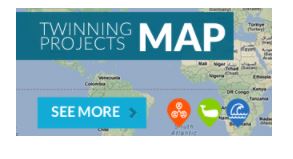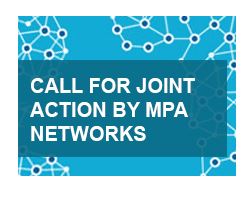A New Atlanticism – Building Effective Transatlantic MPA Partnerships
Last week, 30th and 31st January, EUROPARC Brussels attended the final conference of a promising MPA pilot project, funded by EU: The “Transatlantic MPA Network – Towards a Transatlantic Partnership of Marine Protected Areas” project. Its main objective is to improve the management of Atlantic Marine Protected Areas through effective transatlantic partnership-building, while following a novel, comprehensive concept of Atlanticism.
The international project team consisted of four MPA experts, was led by the president of MedPAN, Purificació Canals and supported by an expert advisory board. Responsible for implementation were B&S Europe, AGRER and TYPSA.
_______________________________________________________________________________________________
During a funding period of roughly two years the “Transatlantic MPA Network” project went through 2 phases – from scoping the status quo of Atlantic MPA systems to the actual piloting of three twinning projects. While there might not be much novelty in twinning as a form of cooperation, there are novel elements to the twinning design the Transatlantic MPA Network came up with:
- the twinning was organized between managers, whereas in its traditional sense twinning rather brings together institutions, authorities or representatives of higher political level.
- the pilot partnerships were composed based on a new and more comprehensive concept of Atlanticism – comprising besides European and North American also the South American and African coasts and waters. Following the understanding, that
an actual joint governance of Atlantic MPAs can only work, if the human networks follow the ecological ones, as they were designed by nature.
______________________________________________________________________
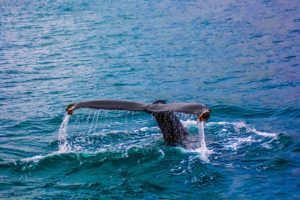
The cross-border routes taken by migratory species might be one of the most evident examples demonstrating need for a comprehensive Atlanticism.
Project Background and Policy Context
The more comprehensive approach to transatlantic networking of the project corresponds to the growing awareness of the need for a more broadly defined cooperation in the Atlantic basin as it is reflected in different EU documents and initiatives. Such as the European Parliament Report (2013) on the key role of the EU in promoting a broader transatlantic partnership or the EU Global Strategy for Foreign and Security Policy commitment to a more extensive dialogue across the Atlantic.
Besides, the project objectives contribute to the EU Communication on Ocean Governance and support the Union policies designed to halt biodiversity loss and foster climate change adaption.
The EU Marine Directive is also addressed by the project, which explicitly calls on each Member State to establish of a network of Marine Protected Areas, thus contributing to the CBD call for a global MPA network.
Eventually, the project works towards achieving the SDG14 and the Aichi Targets 6 and 11 under the UN Convention on Biological Diversity (CBD), calling on the signatory parties to protect 10% of marine and coastal areas through effectively managing MPAs by 2020.

Undoubtedly the value of MPAs as an integral tool in the management of marine ecosystems has been recognized by decision-makers at EU and UN levels. MPAs are considered vital to reconcile human activities with conservation objectives, to allow for the safeguarding of the ecosystems as well as for the realization of socio-economic benefits and research enterprises.
The increased keenness on MPA designation is a clear indicator of this notion. However welcome a development, many do lack clear objectives, measures and monitoring. These flaws are what the Transatlantic MPA Network Project set out to tackle.
_______________________________________________________________________________________________
The Project – Phase I & II (2016-2018)
The project was composed of 2 phases, with Phase I being a compilation of marine conservation practices across the Atlantic, covering MPAs in 64 countries or territories, including coastal PAs and offshore areas. The project team compared ecological and governance characteristics in a scoping study and surveyed MPA managers to identify political commitment, financial strategies, management plans, communication tools or strategies and networking activities. Bearing in mind the restricted time-frame available for the study, it does not seek to cover fisheries, maritime security, or areas beyond national jurisdiction.
Phase II then identified suitable partners to participate one of the three thematic twinning projects with the purpose to explore in close cooperation how effective management can be ensured through sharing good practices and innovations. Intention was to create connections that would last beyond the project life, following the conviction that networking accelerates progress towards lasting, effective and sustainable management. Technical workshops and an online platform were set up to facilitate this process and to support and disseminate the project lessons learned. The pilot twinning projects set up were thematically focused on:
NETWORKS TWINNING: Cooperation and common strategy between MPA networks of managers in the Atlantic region.
RESILIENCE TWINNING: MPAs and coastal resilience, coping with rapid changes.
MARINE MAMMALS TWINNING: Marine mammals’ protection, a way to enhance transatlantic cooperation between MPAs.
Find more detail on the themes and results of the twinning initiatives here.
_____________________________________________________________________________________________
Conference Conclusions and Way Forward
Within the 2-day conference, project lessons learned were exchanged in closed sessions amongst the project partners, then followed by presentations and discussions with a broad plenary. Interest in the conference was considerably high and the plenary was composed not only of project partners and MPA managers, but also of civil society and EU representatives versed in the related fields. Among them were Ricardo Serrão Santos (Member of the European Parliament, Committee on Agriculture and Rural Development, Committee on Fisheries), Daniel Van Assche (European Commission Service for Foreign Policy Instruments), Ms Hilde Hardeman (Head of the European Commission’s Service for Foreign Policy Instruments), Mr Humberto Delgado Rosa (Director for Natural Capital, DG Environment, European Commission), Mr Ramon Van Barneveld (International Relations Officer at DG Maritime Affairs and Fisheries, European Commission), Mr Marc Giacomini (Deputy Managing Director, Human Rights, Global & Multilateral Issues, European External Action Service, EEAS).
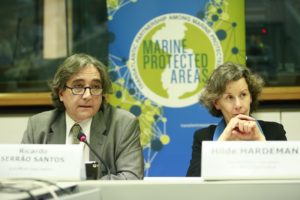
Ricardo-Serrão-Santos-MEP-Hilde-Hardeman-European-Commission-30-Jan-2018-Brussels-Belgium-Final-conference-of-the-Transatlantic-MPA-Network-©-Bernal-Revert-BRU
The EU representatives each emphasized the important role of effectively and coherently managed MPAs across the Atlantic with the Commission explicitly reinforcing its keenness to further support the efforts commenced by the project.
While MEP Santos stated that twinning as a fruitful approach “needs strong political and financial will as well as scientific cooperation”, he brought up that we need a “law of the sea which is guided by shared concerns, connected through our one biogeophysical system”. In his eyes, enforcement is vital.
Mr Giacomini from EEAS highlighted another valuable aspect of strong transatlantic partnerships, namely the peace-securing element to working together for a common cause. He noted, that MPAs are a great opportunity, as they can convey a strong positive narrative of common efforts.
Mr Delgado Rosa pointed to the fact that migratory species simply cannot be managed effectively without multilateral efforts. While acknowledging that they cannot act as “silver bullet”,
MPAs are one essential “puzzle piece” and must be understood and governed as reasonable, properly networked areas.

Puri Canals project team leader (left) and Hilde Hardeman European Commission© Bernal Revert BR&U
Project team leader Puri Canals presented the project results and emphasized the vital role of communication tools and strategies in all aspects of MPA management. Communication must be considered key, as all too often similar visions, ideas and overlapping structures co-exist, thus, losing the reach and impact which a well-merged collective of networks could achieve. Therefore, dedicating time to identify existing opportunities, to revive and adapt them in order to build a well-knit network, is a vital step. The Transatlantic MPA Network project took this approach through its scoping study.
Results of the scoping study were presented by the project’s senior expert Jean-Jacques Goussard, who pointed to the issue of terminology, suggesting to speak of Marine and Coastal Protected Areas (MCPA), as it is coastal areas that are currently most severely pressured.
Puri Canals reminded everyone in the room, that a starting point for realizing a large-scale project might simply mean calling up a friend. After all, the quality of human connection cannot be overestimated in the building of a functioning network, capable of bringing together diverging interests and moving forward towards a shared vision.
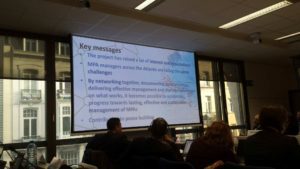 The final take-away messages left conference attendees inspired and energized to get active:
The final take-away messages left conference attendees inspired and energized to get active:
- Managers across the Atlantic are facing the same challenges.
- By networking together, documenting good practices, delivering effective management and sharing experiences on what works, it becomes possible to accelerates progress towards lasting, effective and sustainable management of MPAs.
- The building of partnerships contributes to peace-building.
- The project has now raised a lot of interest and future expectations.
During the closing session several participants voiced their interest to join in the initiatives and proposed to contribute their expertise.
Looking ahead, the European Commission closed the conference by reinforcing they were
confident that we will continue to build on this pilot action (Daniel Van Assche)
and confirmed that EU is considering follow-up action.
____________________________________________________________________
Meanwhile: How can you get involved?
Follow the Call for Joint Action by MPA networks to communicate the added value of MPAs to decision-makers at local and national levels and to increase their visibility amongst policy-makers. MPA managers are called on to team up with research institutions and universities, not at least to prove the monetary value and benefit MPAs can deliver to local communities.
_________________________________________________________________________________________________________
Learn more:
Conference Agenda, Related Websites and Selceted Presentations:
Mediterranean Marine Protected Area Network MedPAN – Marie Romani
How to conciliate urban development and the conservation of Nature ? – Mathieu Ducrocq
Marine Protected Areas in the Mediterranean / UNEP Med Action Plan – Daniel Cebrian Menchero
EU Marine Natura 2000 Network – Vedran Nikolic
Sustainable Use of Fisheries and Marine Conservation with Communities – Houssine Nibani
